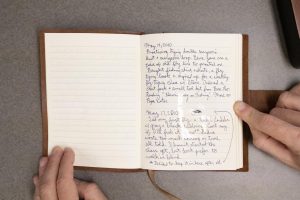Journaling allows a writer to take snippets of their life and create an art piece of words and colors. You are able to create a collection of thoughts from thin air while releasing intense emotions that may have otherwise been kept in.
There is a common misconception that journaling has to be an artistic product every time, but the beauty of the medium comes when you let yourself be free, and follow your intuition. Journaling can take many forms, from to-do lists, to written anecdotes to scrapbooking. It also doesn’t have to cost much; all you need is a notebook, a pen and a little bit of time. Here are my tips for starting journaling:
As a professor of philosophy and jazz at the University of Missouri, Dr. Troy Hall has encountered several philosophers’ views on journaling. One of Hall’s philosophical icons from the late 1800s, Henry David Thoreau, was an avid journaler. According to Hall, journaling was a part of daily life for Thoreau and other educated men.
“It was part of your intellectual activity, and it was where you recorded observations about society, about things that you had read,” Hall said. “You would have your journal with you when you were reading a book. So as you read, you’d be making comments, especially if it’s a library book. You can’t write in marginalia in the book. So you had your journal.”
Thoreau’s journaling allowed himself to find depth in ordinary objects.
“I think that he realized it really helped him with developing the skill of seeing nature, seeing natural objects, seeing a world within, like a leaf or a puddle of water,” Hall said.
For Hall, journaling helps him reflect on introspective moments and return to them. It also allows him to judge if he is thinking clearly.

“I’m often reflective or introspective about a certain experience,” Hall said. “If I want to come back to it, I better be able to remember it. And if I can’t, then that would be a shame.”
Journaling doesn’t have to just be a record of the day. One style Hall mentioned is letter writing, where the journaler can write letters to their future self or to people they feel anger toward.
No matter the medium, journaling allows people to remain alive and encourages them to understand themselves. “It is a purely non-violent way of preserving meaning in your life, and that’s really what we need,” Hall said. “One way to get to know yourself is to write what you’re thinking and to see yourself made object in signs and language.”
Hall shares three of his tips to begin journaling:
EDITOR’S NOTE: This article has been updated to correct Troy Hall’s title. A previous version of the photo caption incorrectly stated his department.
Edited by Molly Levine | [email protected]
Copy edited by Caroline Sweet and Natalie Kientzy | [email protected]








